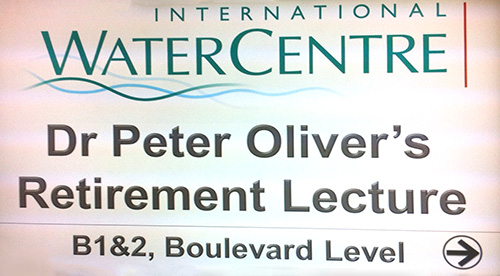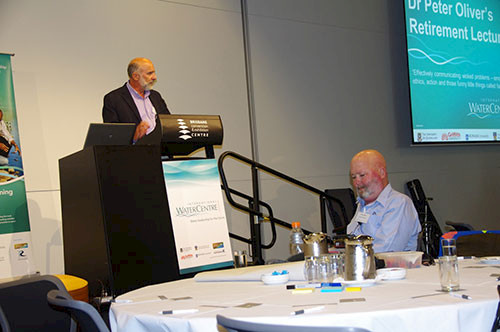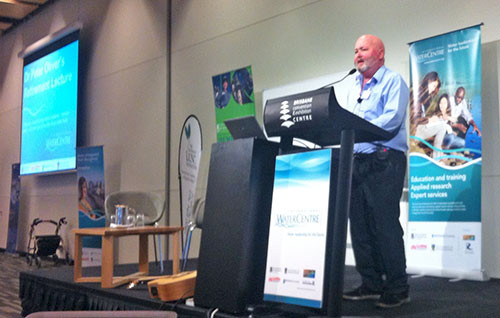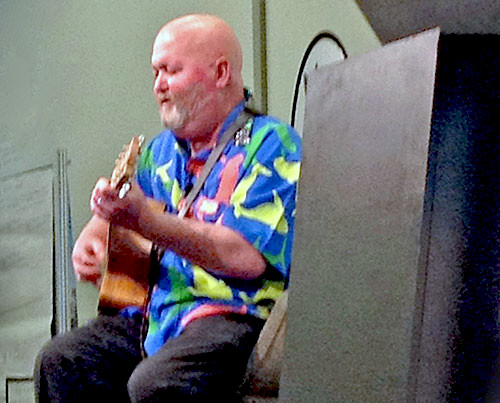Peter Oliver's retirement lecture
Bill Dennison ·Dr. Peter Oliver gave his "Retirement Lecture" at the Brisbane Convention and Exhibition Centre in Queensland, Australia on 23 August 2012. I provided the introduction to Peter's lecture and the text of that introduction is what comprises this blog post. Peter provided a thought provoking, funny and well delivered talk, with audience participation and interaction. He also sang songs, culminating in 'Dugong Rock'. The International WaterCentre will be posting a video of his retirement lecture in the near future.

Peter Oliver's retirement lecture.
Thanks Paul and thank you to Mark Pascoe and his merry band at the International WaterCentre for hosting this wonderful event.
We are here today because of a very special person, Peter Edward Oliver, and I feel that it is my duty to thoroughly embarrass Peter in full view of his family, friends and colleagues.
There are ten words that come to mind when I think of Peter's life and his impact on me and others. Three of these words are fairly obvious: Teacher, Singer and for the past two and a half years, Cancer.

1) 'Teacher' refers to what Peter has been most of his life, either as a science and maths teacher at Maleny State High School, a natural resources officer in the Queensland government or Senior Lecturer in the Master of Integrated Water Management program at the International WaterCentre. Peter developed a variety of novel approaches to teaching, from having students build sand castles on Stradbroke Island, to singing about digestion or line dancing as amino acids. Students remember Peter's lectures and field trips and he produces lasting learning experiences.

2) 'Singer' refers to Peter's integration of song with many facets of his life, including environmental issues. He will show up on field trips or workshops with his guitar, but will also sing a capella at the drop of a hat. I remember the first time I went on a field trip with Peter, when he regaled our dive team during a surface break with several songs, relevant to our discussion of catchments, runoff and water issues. Peter uses songs to connect people in powerful ways and a session with Peter is not complete without a song creeping in.

3) 'Cancer' refers to an insidious disease that has resulted in Peter enduring numerous chemotherapy and radiation sessions, surgical procedures and medical tests. But Peter has NOT let cancer define him simply as a victim. It is in the face of cancer, where Peter has defined himself as a man of great courage, unflagging spirit and incredible strength. Peter has comforted US when we have gone to comfort HIM. Peter has also publicly advocated for better lung cancer awareness, treatment and research.
There are seven other words that are less obvious, but particularly important in the life of Peter Edward Oliver. These seven words are family, pirate, Lyngbya, dugong, connections, philosophy and love.
4) The word 'family' is very important to Peter. Peter was born into a teacher's family in 1957. Peter's parents, Colette Oliver and the late Ted Oliver raised their family of five children in various locations throughout Australia. Peter's mother Colette, brother Tim and sister Sandra, and nieces and nephews are here today. Peter's eyes sparkle when he talks about his wife and children. I have never had a extended discussion with Peter in which he did not mention in glowing terms his lovely wife Ann. He and Ann have raised three very special children, Jayne, Katie and Michael in their Maleny house where Peter's parents had lived.
5) The word 'pirate' is particularly relevant for Peter, as he has an alter ego, Pirate Pete, aka Greybeard. As a Catchment Coordinator, Peter dressed up as Pirate Pete, growled "Argghhh" quite convincingly and engaged shoppers in discussions about catchment issues at shopping centres. More recently, at Relay for Life events at the Maleny Showgrounds, which raises funds and awareness for cancer survivors, Peter's family and friends dress up as a gang of pirates known as the Jolly Ollie's and they terrorize the other less fierce groups.
6) The word 'Lyngbya' is a scientific name for a noxious slime that grows in Moreton Bay and first brought me in contact with Peter fifteen years ago. Peter was developing a working relationship with fishermen of the Deception Bay region when they asked him to do something about the slime that was inducing severe skin rashes. Peter came to the University of Queensland and wandered around campus clutching a plastic bag of slime until he found someone who could identify it. It turned out that my wife Judy O'Neil had just done her dissertation on Cyanobacteria or blue-green algae and she was able to identify the slime as Lyngbya, a cyanobacterium. We proceeded to develop an active Lyngbya research and management program which continues to the present, and includes some of the same fisherman like Greg Savige who first identified the problem.
7) The word 'dugong' refers to large marine mammals, the original sailor's mermaids, or sea sirens, that help make Moreton Bay so special. If you stand on one of the Glasshouse Mountains and look to the East and use your imagination, you can see Bribie Island as a large dugong feeding on the Deception Bay seagrasses. Peter has written a song called 'Dugong Rock' which has inspired singing, dancing and some considerable cavorting about. He recently sang a verse of Dugong Rock in his acceptance speech when he won the Healthy Waterways Champion Award. A large stuffed dugong, known as Dewey, has been spotted at various locations around Queensland catchments, inspired by Peter. Peter even has a fighting dugong tattooed on his arm to signify his battle against cancer. The title of the book that Peter and I are collaborating on is 'Dancing with Dugongs'. Incidentally, writing this book with Peter is one of the best decisions I have ever made in my life. Dugongs are clearly a theme in Peter's life and I often wonder if Peter sees a personal resemblance in those rotund, whiskered beasts.
8) The word 'connections' refers to Peter's ability to connect people to each other, connect people to the land and water and connect people to a deeper understanding of life. When Peter walks into a room, it is not to say "Here I am", rather it is "There you are". Peter loves making unlikely connections: fisherman and Ministers of the Environment, marine biologists and land managers, or catchment coordinators dressed as pirates and motorbikers. Peter leads interesting and informative field trips which serve to connect students to the land and water. Peter also catalyzes a deeper understanding of life through sharing his experiences and encouraging self guided learning. In spite of illness or distance, Peter remained connected to his IWC colleagues and even US colleagues through Skype, and connected to his family and friends through houseboat trips, wood fired pizza parties and visits to Maleny.
9) The word 'philosophy' refers to Peter's approach to life and death, and his intellectual journey of learning. Peter received his Bachelor of Science degree from Griffith University in 1978. He received his diploma of Education from the University of Queensland in 1981 and his Masters of Education from Deakin University in 1995. Peter's dissertation was entitled "Developing effective partnerships in natural resource management" and he received his Doctor of Philosophy from Griffith University in 2004. Note that Peter's highest degree is Doctor of Philosophy. Peter is indeed a philosopher who reads widely, thinks deeply and writes eloquently.
10) The word 'love' refers to what has brought us together today. There is a great line from "The Wizard of Oz" where the Wizard says to the Tin Man the following: "A heart is not judged by how much YOU love, but by how much you ARE loved, . . . by others." I would like to modify the last word of this quote and invite Peter Edward Oliver to the podium to present his retirement lecture. Peter, as you gaze out on all of us here, please think of these words, "A heart is not judged by how much YOU love, but by how much you ARE loved, . . . by us".
About the author
Bill Dennison

Dr. Bill Dennison is a Professor of Marine Science and Vice President for Science Application at the University of Maryland Center for Environmental Science.